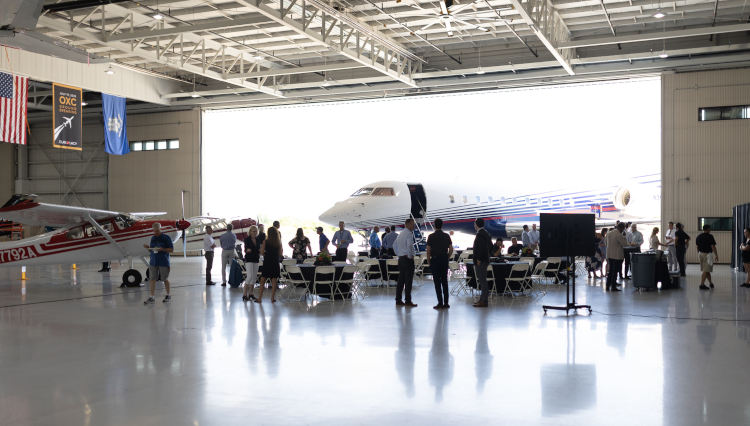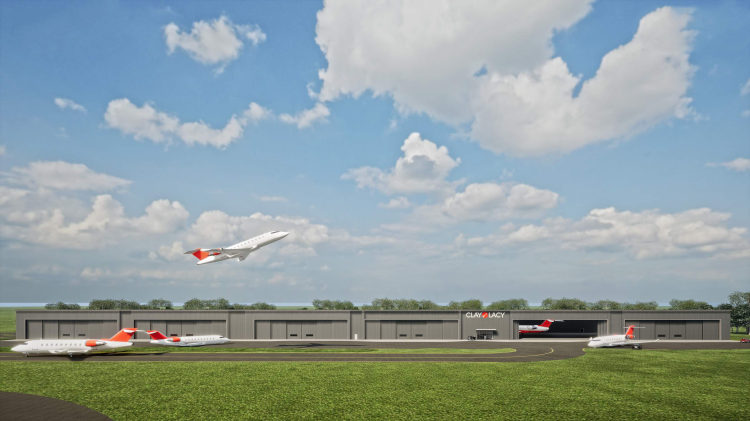When SherpaReport checked in with Clay Lacy Aviation last year, the company was experiencing some exciting post-pandemic growth. They were also in the midst of an environmental audit to measure the effectiveness of a wide range of new sustainability initiatives. One year later, we follow up to see how things are progressing as Clay Lacy continues to expand with a new FBO and sustainability awards.
Expansions to the Fleet
Clay Lacy Aviation focuses on private aviation charters and aircraft management. In doing so, they can offer one of the most diverse charter fleets in the nation. Recent additions to the company’s selection available for charter include several larger longer-range aircraft, including a Bombardier Global 5000, two Gulfstream jets, two Embraer Legacy 600s, and a Falcon 900EX. The total fleet now numbers about 130 aircraft in 37 cities.
Scott Cutshall, Senior Vice President of Development and Sustainability, says, “As we continue to add capabilities and personnel, this is attracting new aircraft.” He adds, “We are getting a tremendous amount of interest from aircraft owners and corporations across the country.”

Expansion in the North East
Clay Lacy Aviation began on the West Coast in 1968. As the company’s charter business grew, so did its reach across the US. In 2016, Clay Lacy expanded to the North East, with services based at Waterbury-Oxford Airport in Connecticut. In July of this year, that commitment to the north east was further cemented. A groundbreaking ceremony marked the beginning of construction on a $20 million FBO and MRO facility which will create more than 200 jobs. The facility will complement Clay Lacy’s two existing west coast FBOs at Van Nuys Airport in Los Angeles and at John Wayne Airport in Orange County. The 11-acre development will have a passenger terminal, office space, and a 40,000 square-foot hangar. It is expected to be completed by the spring of 2024.
Cutshall says that Boston and New York have been “extremely popular destinations for our aircraft owners and charter customers for many years.” The Waterbury-Oxford location is “geographically central to both cities” and has “good infrastructure to support future plans.”
Also announced at the ceremony was a new annual scholarship program offered in conjunction with CT Aerotech, a Hartford-based technical school with a focus on aviation mechanics. The two-year program will include an internship and intends to train and support a new generation of aviation professionals. John Ryan, Principal of CT Aerotech, says that the scholarship will be part of “a great pipeline to support Connecticut and its economy.”
Construction of the facility will be certified carbon neutral and is designed to match Clay Lacy’s Sustainability Strategy. In addition to efficient building design, there will be space for solar panels and charging stations for both electric vehicles and electric aircraft. Sustainable Aviation Fuel will be available.

Recognition for Sustainability
Speaking of sustainability… at the time of writing last year, Clay Lacy Aviation had created a 9-point sustainability strategy and was undergoing an independent sustainability audit with 4Air, the first company to do so. The 4Air audit resulted in a Facility Green Level rating, all company facilities have been carbon neutral since 2019, and Clay Lacy Aviation was the first company to be certified to the National Air Transportation Association’s (NATA) Sustainability Standard for Aviation Businesses.
In April 2022, the Environmental Protection Agency certified Clay Lacy as a member of the agency’s Green Power Partnership, in recognition of sustainability efforts. The Green Power Partnership is a program that recognizes and supports businesses that voluntarily adopt eco-friendly practices. A key achievement for the charter operator has been using renewable energy resources to source 33% of its energy needs.
Cutshall expressed pride in the company’s achievements, saying, “Receiving the EPA’s Green Power Partner Certificate was a key goal of our corporate sustainability strategy and validates the efforts we’ve undertaken to operate more sustainably.”
While the recognition and certifications are very much appreciated, Cutshall is quick to note that sustainability is more than a political topic of the day. Instead, it is “a sound responsible business practice that encompasses three key areas: Environment, Social, and Economic sustainability.”
He says "A company must put new practices in place to ensure their operations are sustainable in these three key areas. Environmental is taking care of a precious resource, and operating in a way to reduce emissions, eliminate waste, conserve water, and other practices that help take good care of our planet for generations to come. Social is ensuring the future of our industry and company through activities such as internships, scholarships, job shadow days, mentoring, and other activities within our company to promote comradery and a unified sense of mission. Economic is operating in a way to ensure the future financial health of the company which provides for our employees. You need to focus on all three spheres to have a truly sustainable organization."
In Other News ......
The record demand for private aviation is continuing, an indication of what Cutshall says is the “human need for interaction.” As we have noted in earlier articles, the growth is partly due to a high number of first-time customers, attracted by the benefits of private aviation and then loyal devotees who appreciate the high quality of service. It is a trend that Cutshall says he hopes will continue for many years to come.

